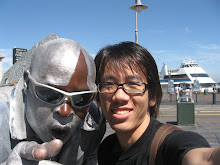Today let's discuss the meaning of a symbol.
A symbol is not of the same quality as the things we touch, the things we know. It has the power to unite and unify people, to converge interpretations onto a single thought if one authoritative interpretation is present. A symbol keeps people tamed. It should not be questioned, but I believe that we are reluctant to question the authority of a symbol because we are afraid that it will collapse. We are afraid that it is fragile in reality. Perhaps, we already know it is fragile and yet we hold on to it and try to keep it standing in order to avoid a collapse and uncertain disorder that we are not used to.
The jester in Andrei Rublev makes fun of the upper classes. He creates a story of a man in those upper classes who loses his beard, and with it is shamed even by his wife. It topples the order that we had that those people are respectable and should not be seen in such a despicable light, of having lost what is seen as a symbol of status, his beard. How he runs back home just like any creature, and how he is insulted by his wife...when the order is that a wife should not be disrespectful to a husband. And more so for people of that class. More so for the man of that class. It is mockery, and on one hand we laugh. The audience laughed. Why do we laugh at mockery? Why do we laugh? I remember one position vaguely, it being that we laugh at what we are afraid of. Perhaps we laugh at that because we are afraid of that happening in reality. It will shatter so much order that we feel comfortable in.
Women are not allowed to watch certain events. Should they see fear and pain in a man's eyes, will they still, and I'm refering to women of centuries ago, respect their men whom they have been brought up to see as a symbol. They have had little real contact. They don't know men, as men don't know women. They only know that they are the ones they look up to.
If God were mocked, we would laugh at God. Can you imagine if he had to go through the wretchedness of the world. If we personified God and imagined a scenario where he had insecurities or fallings. We shouldn't mock God. But firstly, we do not understand much of God enough to actually make a mockery. Whereas the mockery of a pope, should one tell the story of perhaps how he sat on a thumbnail and jumped up and for a moment lost dignity, we can actually think it true because we know the pope is a human.
A symbol seems to build artificial walls. But how artificial are they? And how good, or necessary are they? Good here is a very ambiguious term. Can we disrespect our parents? Can we be so liberal to consider ourselves equal human beings that our parents do not deserve a certain right over us? Or perhaps only up to a certain age? How do we determine the age? How wretched it would be to see a father as a symbol of love and strength, and to witness by chance or not a situation where he is getting scolded by his boss, or being fired, or finding himself helpless...etc. How wretched this world really is. That symbols are built and crushed. That apparently disorderliness seems to rule, and that acceptance of disorder is a defence mechanism against disappointment.
Tuesday, November 25, 2008
Subscribe to:
Post Comments (Atom)

No comments:
Post a Comment